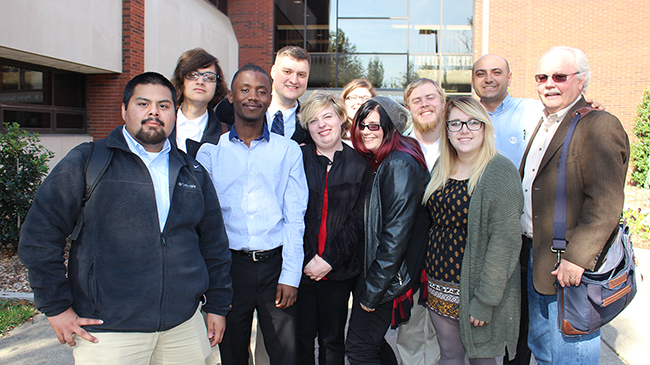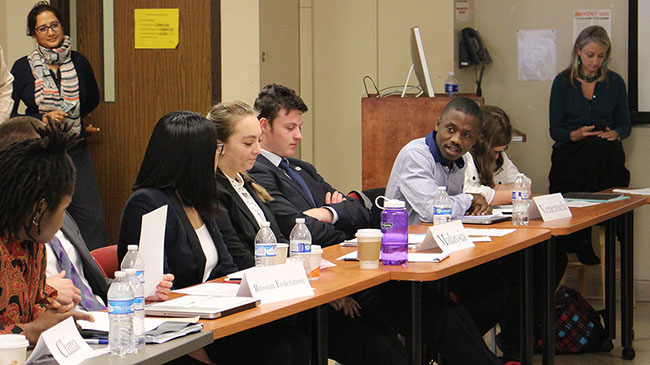By Steven Krolak
(NEW ALBANY, Ind.)—At exactly 11.30 a.m. on Sat., Nov. 5, during the final session of this year’s Model United Nations Security Council for Colleges and Universities, a messenger handed a slip of paper to the Council chair, Amanda Miles from IU Southeast.
The note informed her that the President of the United States had been just been assassinated.
Gasps. Groans. Rapid-fire consultations. Face-palms. Hasty scribbles amid a flurry of shuffled papers..
Then Miles invited the delegations to issue statements. Name cards went up, and the room grew quiet as the positions of Uruguay, Senegal, Spain, Russia, the United States and others were put forward.
For the students, this was one of several such unexpected events that interrupted the already energized flow of repartee surrounding contentious international issues, and forced them to think on their feet, adopting positions and launching motions and casting votes that would have wide-ranging ramifications for the interests and strategic goals of the countries they were representing, and the world.
At this, the 38th annual Model United Nations Security Council organized by the Indiana Consortium for International Programs and held at the University of Louisville, 59 students from IU Kokomo, IU Southeast, University of Evansville, University of Indianapolis and University of Louisville represented 15 countries.

The IU Southeast team at the 38th Model United Nations Security Council included (front row from l) Victor Martinez, Mark Jallayu, Amanda Miles, Kat Faulkner, Brianna Misamore, Prof. Cliff Staten, (back row from l) Kyle Ezell, Heath Ezell, Lauren Downs, Trevor Allen, Shahram Ghahremani. Not pictured: Roger Howard, Ashley Smith.
Over two days, the two-person delegate teams staked out positions on issues such as the crisis in Ukraine, the conflict in Syria, Chinese expansionism in the South China Sea, the civil war in South Sudan, and Israeli settler violence against Palestinians in the West Bank. They alternately pushed for or pushed back against resolutions of censure, motions for joint action, requests for sanctions and other diplomatic measures.
Keynote speaker was Andrea Risotto, director of communications for the Better World Campaign of the United Nations Foundation in New York, N.Y., who spoke on the topic, “One Humanity, Shared Responsibility: Addressing the Refugee Crisis.”
IU Southeast sent twelve participants:
Trevor Allen and Ashley Smith (Uruguay)
Lauren Downs and Mark Jallayu (Venezuela)
Heath Ezell and Kyle Ezell (Ukraine)
Shahram Ghahremani and Victor Martinez (Venezuela)
Roger Howard, Kat Faulkner, and Brianna Misamore (United States)
Amanda Miles, Chair
At the end of the Saturday session, the student delegates voted on the effectiveness of their peers.

Mark Jallayu of IU Southeast (third from right) makes a point at the Model U.N. Security Council.
Mark Jallayu and Roger Howard of IU Southeast won a best-delegate award (third place in each council). Amanda Miles was recognized for her service as chair of Security Council Group Two.
Miles, a senior from Georgetown, Ind. majoring in Spanish, was participating for the third year, having been a delegate in previous Security Councils. For her, the benefits of the simulation transcend the issues being discussed.
“Communication skills are the biggest benefit I have gained,” Miles said. “You learn about foreign policy, but you also learn a lot from interacting with the other delegates, thinking on the spot, and getting resolutions and motions passed by getting people to work with you.”
For first-timer Heath Ezell, a junior from Sellersburg, Ind. majoring in political science and representing Ukraine at the Security Council, the Model U.N. helped build skills he can use in government or law school, his two preferred career paths.
“The model U.N. called for litigation skills, getting familiarized with issues and arguing those issues from a standpoint that doesn’t necessarily align with your personal views, and also being able to do it outside the classroom, where there are multiple schools and viewpoints,” Ezell said.
Cliff Staten, professor of political science at IU Southeast, acted as faculty advisor for the 28th year, a reflection of his passion for the project and its contribution to learning goals.
“This is not just standard classroom stuff,” Staten said. “The skills you acquire and practice at the Model U.N—public speaking, research, writing, debate, consensus building, negotiation—are skills that can be used in any aspect of life.”
At the close of the event, it was announced that next year’s Model United Nations will be held at IU Southeast.
The Indiana Consortium for International Programs (ICIP) is a group of colleges and universities in Indiana and Kentucky devoted to the development of the international dimension of its member institutions. ICIP works to improve faculty competence, encourage greater student achievement and awareness, develop curriculum, and provide services to assist member institutions in their individual international programs.
Homepage photo: IU Southeast student Ashley Smith makes a point during the Model United Nations.


